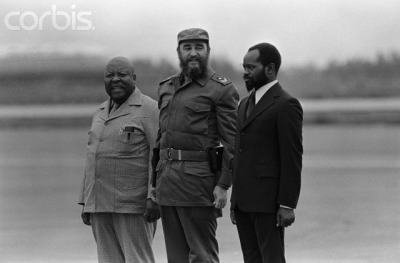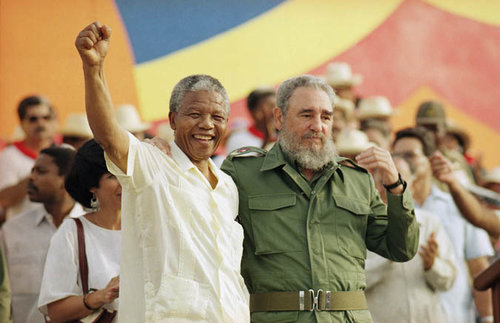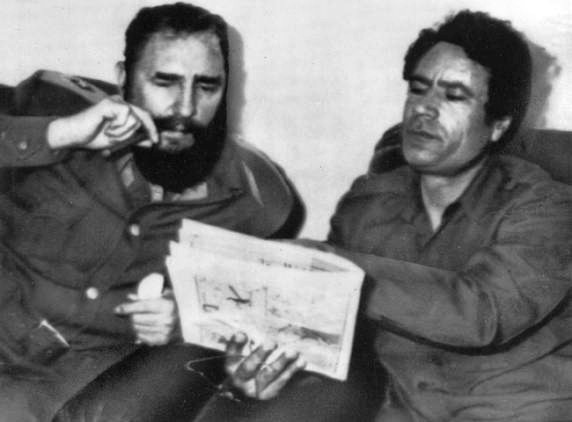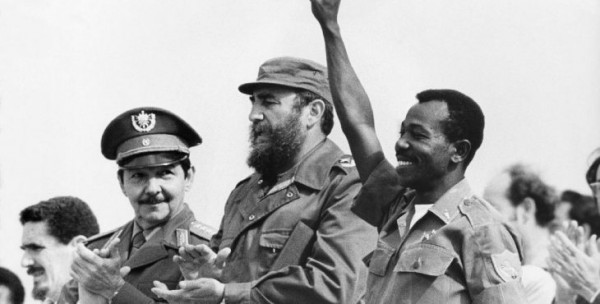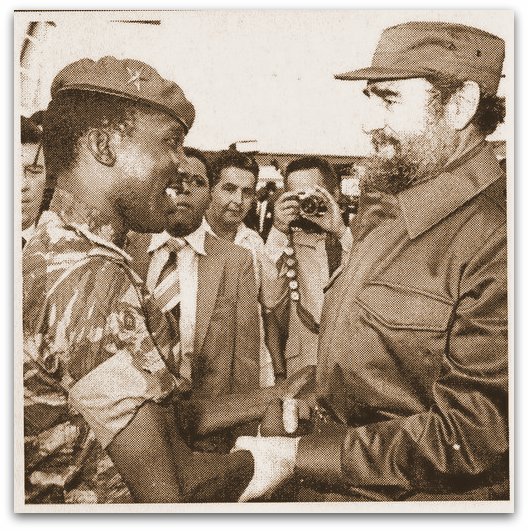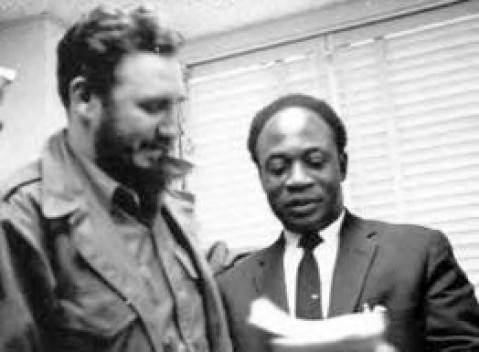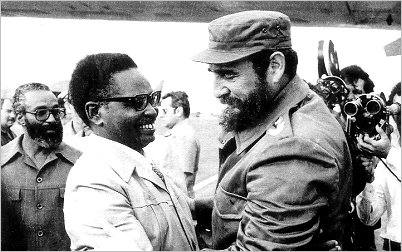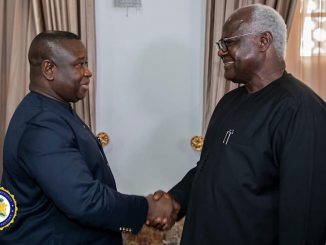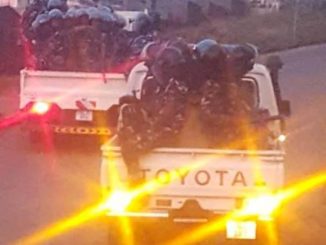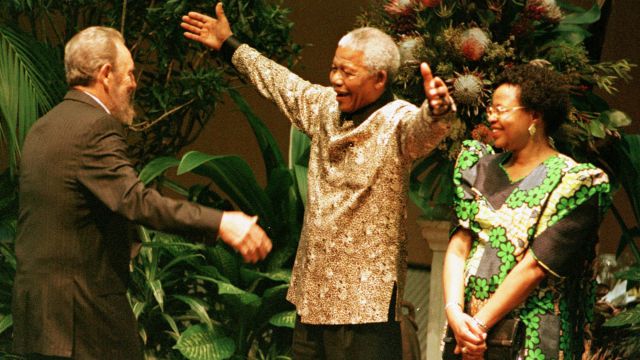
(Editor’s note : Many of the photos were added by COCORIOKO )
With Fidel Castro gone, Africa’s liberation leaders lose a loyal friend and a hero of the people.
In Castro, nonetheless, African activists found a leader willing to share flaming rhetoric as well as practical guidance to freedom at a time when Africans had few political allies. Those liberation leaders became the founding fathers of modern Africa, and they never forgot Cuba’s help.
In grainy black and white images, Castro is seen smiling with Ghana’s Kwame Nkrumah, Angola’s Augustinho Neto and Tanzania’s Julius Nyerere. Castro’s influence can be seen in Mozambican independence leader Samora Machel’s army fatigues and vociferous speeches. Cuba also became home to young African activists in exile.
In his own country, and to many in the West, Castro’s regime was a repressive, single-minded pursuit of a communist revolution, no matter the human cost, even while acknowledging his dynamic impact on the course of history over the last six decades. Many Africans, however, look to his leadership as one that sought equality and development, and they joined Castro in blaming sanctions for Cuba’s difficulties.
It was perhaps Cuba’s willingness to fight side-by-side with Africans that made him such a towering figure on the continent. In 1975, as Angola gained independence from Portugal, it offered a safe haven to then liberation movements hunted in their own countries: the African National Congress, the Zimbabwe African People’s Union and Namibia’s South West African People’s Organization.
When the apartheid government, aided by the United States, attacked Angola, it was Castro who came to the Africans’ aid. He sent 36,000 troops who succeeded in pushing the South African soldiers back while also training African fighters. Cuban troops remained in Africa until 1988, when an apartheid South Africa agreed to withdraw and grant independence to Namibia. Castro’s defiance of the United States was seen as defiance of imperialism and neo-colonialism by African freedom fighters.
“We are being advised about Cuba by people who supported the apartheid regime. No honorable man or woman could accept such advice,” Mandela Nelson Mandela once reportedly said that when he heard of the Cuban army’s victories in Angola, he was heartened by the idea of a non-white army out-maneuvering a white army. Upon his release, Castro was one of the first leaders Mandela met with, and dismissed criticism of his friendship with the politically isolated Castro.
“We are now being advised about Cuba by people who have supported the apartheid regime these last 40 years,” he said on a visit to Havana in 1991. “No honorable man or woman could ever accept advice from people who never cared for us at the most difficult times.”
FIDEL CASTRO AND THOMAS SANKARA
Fidel Castro and Ghanaian Pan-Africanist, Kwame Nkrumah
Archive footage shows just how wide Mandela grinned and how tightly he embraced his friend Castro. South Africa’s parliament broke out in song when Castro visited and an emotional Sam Nujoma, the founding president of Namibia, thanked Castro for helping to free his people. Even among ordinary Africans, Castro remains a hero with many babies bearing the name Fidel or Castro.
Fidel Castro with Agostinho Neto
Castro’s backing of some African leaders, however, alienated others. In 1977, Castro sent as many as 15,000 troops to back Mengistu Haile Mariam’s fight against Somalia. The Cuban involvement forced Somalia to cede control of the Ogaden region—a blow to an army that believed victory was in their grasp. Some Somalis are still bitter.
Castro’s commitment to Africa continued in post-liberation Africa. The country still trains African doctors, and continues to send doctors here. When Ebola ravaged Liberia, Sierra Leone and Guinea, Cuba lead international aid efforts when other world powers fretted. It is a relationship likely to continue long after Castro’s death.
CREDIT : QUARTZ MAGAZINE
______________________________________
Fidel Castro’s ties to Africa’s liberation struggle
The announcement of the death of Cuba’s revolutionary leader, Fidel Castro has been received with mixed reactions especially by Cubans both home and in the diaspora.
But as a towering figure who stayed true to his Marxist-Leninist ideology even after the collapse of the Soviet Union, it is quite clear why even in death, Castro could still get people divided.
If there was one region however that benefited or so it seemed, from the rise of Fidel Castro as leader of Cuba, it was Africa.
Quite apart from his contribution to the liberation struggles on the African continent in the past, some countries on the continent, including Ghana, still benefit from the health-care services provided by Cuban doctors who visit the country on rotational basis.
Back to the 1950s when Castro and his cohorts including Ernesto Che Guverra and his brother Raul were plotting to free Cuba from the right-wing dictator, Fulgencio Batista, extending his liberation struggle beyond the Americas was probably not in the plan.
Fast forward to the rise of the Black Power movements in the 1960s as well as the pan African movements of the 1970s and you would notice that the struggle for liberation from colonial powers by Africans got a little help from the western hemisphere.
Fidel Castro joined two major battles on the African continent – in Angola and Ethiopia at the height of the
cold war – as he was convinced that the global stage for the world revolution was happening in Africa.
Responding to calls for help from the Angolan Marxist guerrilla leader Agostinho Neto who had seized Luanda during a bloody war from the Portuguese, Castro sent troops to Angola.
Cuba’s involvement in battles far away from home however came at a cost. Some 4,300 Cubans are believed to have died in conflicts in Africa, half of them in Angola alone. Experts however say the numbers have been sharply underestimated.
Castro’s support for Africa’s liberation led him to meet with some of the continent’s leaders including Patrice Lumumba of Congo, Ghana’s Kwame Nkrumah, Sam Nujoma of Namibia, Nelson Mandela of South Africa, Muammar Gaddafi of Libya and Robert Mugabe of Zimbabwe.
Cuban soldiers are documented to have fought alongside Nambians and South Africans to prevent the apartheid regime from spreading all over southern Africa.
Cuban troops have since the 1960s, served in Algeria, Guinea, Guinea Bissau, Equatorial Guinea, Sierra Leone and Libya.
CREDIT : AFRICANEWS

